- Home
- Edmund White
Our Young Man Page 2
Our Young Man Read online
Page 2
A month later Morrison was dead and buried in Père Lachaise, the two moles had been burned painlessly off Guy’s chest, and he was successfully weaned from cigarettes after fighting a real struggle (and gaining ten pounds). Pierre-Georges had helped him lose the weight by feeding him amphetamines and had finagled him some very lucrative contracts. Guy had learned that though Pierre-Georges liked to be seen in public with very young models and pretty ephebes, he preferred rough middle-aged brutes in bed whom he dragged home from a bar on the rue Keller. Pierre-Georges encouraged fashion insiders to think Guy was his lover, all the while protesting Guy was “hopelessly straight” and affianced to a silly girl back home in Clermont-Ferrand. Word got out that Guy was as heterosexual as the American guys Bruce Weber was flying over to the Hôtel Meurice and photographing horsing around in the Bois de Boulogne. Zizi Jeanmaire—her spiky hair dyed freshly black—stared at Guy meaningfully over dinner. “He’s not straight,” she said dismissively on her way out, as if no normal man could resist her.
A young American photographer, who lived at the end of a lane on the Left Bank, not far from the offices of Le Monde, invited him to pose for a catalogue of ski gear—he even had a simulated, snow-covered slope all set up. The photographer, Hal, was a joli laid, not really handsome, with kinky blond hair, big lugubrious eyes of faded blue, big dumpling ears, but he’d done everything to make his look streamlined, modern, effective; his hair was tamed with brilliantine, it seemed, and he lifted weights and was wearing a tight T-shirt to prove it. He had a collection of plates made from broken, colorful shards, which he called pique assiette, and the soaring walls of his studio were painted green in such a way as to look smudged and to leave traces of the brushwork.
They had to work quickly before the snow melted and there were lots of clothes to get through. There was no one doing hair and makeup, nor a dresser, but Guy was a good sport and half the time he was in his underwear as he changed.
Hal was unsmiling (did he think that made him more soigné, or was he really bored by life?) but he was friendly enough, though he stared too much and took too long to answer questions in his deep voice. It couldn’t be a matter of his comprehension—he’d lived here five years, he said, and his French was good. He didn’t even have much of an accent.
And then, as Guy was getting dressed to leave, Hal said, “I’ve got an idea. Let’s do some nudes. You’ll be happy someday to have a record of your beauty, your youth.” When he saw a hesitant look on Guy’s face, Hal said, “They’ll be just for us. I’ll give you the prints. And nothing pornographic.”
A large brown envelope arrived in the mail saying NE PAS PLIER (Don’t Bend) and reinforced with stiff cardboard. Inside, in glassine envelopes, were several full-color nudes of himself posed against the snowbank. He was naked except for a pair of skis he was holding straight up and a stocking cap. Guy looked at the pictures through a loupe. His uncircumcised penis was large enough. His chest was hairy and he had a clear treasure trail pointing down from his navel to his crotch. He liked the way he appeared, though he worried his forearms looked too small.
Three months later Pierre-Georges steamed into Guy’s studio without knocking and slapped down on the kitchen table Guy’s full-page nude in the American gay magazine Blueboy. “Slut, you’ve just sunk your career,” he sputtered. “And it doesn’t even look big.” It took a long dinner and four glasses of Bordeaux for him to go from sputtering to simmering.
“You’ve spoiled all our good work,” he said in a drained, tragic voice. “The whole game with models is never to let the public see everything. Make them dream, make them imagine! Let them see a haunch, not a strange little penis.” He said the harsh slang word bitte.
Guy told him the whole story of Hal’s treachery and Pierre-Georges hissed, “Idiot!” Then he relented and said, “Well, it’s an American magazine. No one here will ever see it and he called you Ralph, of all things.” He reflected. “But that is where we want to sell you, America. That’s where the money is.”
Guy had a new thought: “Anyone who buys this magazine shares our vice, and who would admit that?”
“I’m not talking about confession but about gossip.”
Guy longed for a best friend, a confidant. He liked walking everywhere in Paris despite the sudden heat, but he wanted to discuss things with a friend, male or female, and his solitude made him melancholy. He looked at store windows on the Left Bank and across the river on the rue Saint-Honoré and tried to decide whether he liked best Hugo Boss or Kenzo or Lanvin. He coveted a pale gray silk bathrobe from Lanvin but he rebelled at the $1,000 price tag: He laughed when the disdainful clerk at Hermès told him the small pigskin valise with the brass fittings cost $6,000. He wasn’t very sure about money. He didn’t know how long people would want to hire him. He was a popular runway model but he’d have to wait until September for the spring collections to work again. The booking agent at Vogue liked him but editorial didn’t pay much, and besides, they didn’t want the same male faces to become too familiar to their readers. He had a big, well-paying yogurt account for print, and then he did a commercial for Brie where he had to dress as a starving young monk who fell on the cheese the second the older, chubbier monks left him alone. That spot ran ten times a day on TV for a month and the residuals kept rolling in.
He had grown up poor. They had a small, smelly trailer they drove around France for vacations; in the trailer park outside Montoire-sur-le-Loir they’d stayed for five nights. His father set up an awning and a grill and drank even more red wine than usual. That’s where Guy had lost his virginity to a shy, lovely girl from Vichy named Violette. They were both fifteen. His family never ate in restaurants, not even cafés, when they were traveling. Guy had loved clothes but never had had money to buy them. Now, in Paris, he had money but was very practical about saving. Most of his clothes were given to him by designers at a severe discount.
For nearly a decade he was the darling of Paris. He bought an art nouveau apartment designed around 1910 by Guimard, the man who had done the Métro entrances. It was small, but Pierre-Georges declared it “distinguished” and approved that it was in the safe, serene, and nonhappening sixteenth arrondissement. Publicly Guy dated starlets and female models, who mostly were pleased he didn’t expect them to put out. Privately he’d go off at the end of long, bibulous evenings with other good-looking young “straight” men he met at heterosexual pickup bars on the boulevard Montparnasse, guys who like him had been unlucky with lining up a girl for the evening before last call. But he never saw one of these men more than once and never gave out his real name.
Pierre-Georges said to him, “You’re universally liked because you’re such a black hole in space. You don’t have any real traits. You’re sympa, at least as much as a narcissist can be, but that means nothing. You’re beautiful and everybody projects onto you what they’re looking for, which is easy to do since you don’t stand for anything definite. You’re a black hole in space.”
Then Pierre-Georges sent him to New York for a Pepsi commercial, where his Frenchness was of no relevance; in fact, he had to dress in jeans and a sports shirt and flip burgers among young Americans at a picnic shot on a rented estate in Far Hills, New Jersey. It was 1980 and suddenly male models, two years after women, were becoming “supermodels.” Their names were known; the public gossiped about them. Their hourly rates went up. The public laughed at them for being overpaid, but Pierre-Georges pointed out that the career of a model was very short.
Guy worried about everything. The currency in America never made any sense to him since nickels were bigger than dimes, which were worth more. From all those Fred Astaire movies, he thought everyone in New York would be in evening clothes, but actually they were badly dressed and coiffed. Chicly dressed women wore sneakers (he was told they’d put on their heels at the office). Many men looked unwashed. He was shocked how obese some Negro women were and how unselfconsciously, even sloppily, they rolled from side to side down the sidewalk. Portions i
n restaurants seemed comically large and he was puzzled that several places offered “all you can eat.” The doggy bag was a new idea. New York struck him as dowdy and provincial but strangely electric. Everything was fast and careless, even the hurried way shopgirls wrapped packages. Oddly, waiters were extraordinarily friendly; at one place in the Village the waitress sat down with them and said, “I hope you folks don’t have a complicated order. I’m completely stoned.” Although Guy fancied he knew English well, he had to ask the photographer’s assistant what “folks” and “stoned” meant. From then on Guy used “folks” as often as possible, as in, “They are very funny folks,” thinking that meant they were amusing. Calling someone “amusing” just seemed to irritate New Yorkers.
Even so, he was a huge success in America. There didn’t seem to be room, not even in New York, for several French models, but Guy quickly became the go-to French guy. He met all the top photographers, including Hiro, a very pure, quiet Japanese artist who would arrange a few objects and get ravishing forms and citrusy color combinations, and Richard Avedon, much smaller and younger than Guy had imagined, a very bossy, hardworking genius who told him, “These days I just shoot constantly and my work has all the excitement of confetti.” Avedon was so slim and stylish even in his work clothes that he didn’t seem American or even heterosexual, but he was famous for his celebrated women friends, including the legendary model Dovima, the one he’d photographed with an elephant.
Pierre-Georges told him that New York was very dangerous and when he took a taxi home he should have the driver wait until he was safely in the front door. He could be mugged crossing the five meters between the cab and his lobby. He lived in Greenwich Village (he had trouble pronouncing “Greenwich”) in a floor-through of a brownstone on the corner, illogically, of West Fourth and West Eleventh. Pierre-Georges had found it and even furnished it for him, though Guy was allowed to place family pictures on tiny silver easels Pierre-Georges bought. Guy also draped an extravagant silk scarf across the plain beige couch, but Pierre-Georges teased him about it and he folded it and put it away the next day.
He joined a nearby gym upstairs at Sheridan Square. There was lots of loud joking among the folks working out; some of them were grotesquely muscular and one guy had to be helped up the stairs by his brother. Every day the guy ate an entire rotisserie chicken and drank a pint of bull’s blood. Guy couldn’t understand most of the gibes, but it seemed half the folks were gay and half normal and they were joking about which orientation was more amusing: “Just think of dick as pussy on a stick,” one of the loudmouths guffawed. The population of the gym was at the tipping point between gay and normal.
In the cedar-lined sauna a polite flabby man with a bushy gray mustache and expensive sapphire eyes and the ruins of good looks struck up a conversation. His nipples were the size of erasers. In Paris Guy would have been curt, but here in America folks appeared to be vulgarly friendly. When the man, un vieux beau, heard Guy’s accent he switched to a very good French. He said his name was Walt and he was from San Francisco, but he didn’t really work because he had to be free to travel with his older friend, a Belgian baron and banker who was always in transit between Gstaad and Phuket and Venice and Mykonos, you really should meet him, and what do you do, oh, I suspected as much, I know you’re not supposed to ask French people what kind of work they do, but hey, we’re in New York, and Walt laughed at the funny coincidence of that.
By chance they got out of the sauna at the same time and headed down the hall to the showers. Walt cupped one of Guy’s hot buttocks; Guy glared at him but Walt looked unfazed, as though he’d been innocently testing a melon for ripeness or as if someone else had done it. In the shower Walt continued smiling and chatting but he made a bit too much out of laundering his genitals. Although he was too fat, strangely enough Guy could imagine it would be fun to hold him. Walt had a body meant to be held.
When they were dressed and heading out, Walt wrote down Guy’s phone number. Under his taut silk briefs Guy could still feel the shocking familiarity of Walt’s hand, but it confused him. He’d never been attracted to anyone over thirty, at least not to his knowledge, but he was secretly thrilled by the infringement of that brazen touch. Maybe it was because such an obviously civilized man, who spoke French and skied at Gstaad, had done it—as if someone in evening clothes had knelt in the mud to suck his cock. After all, Walt vacationed in Thailand, he studded his conversation with references to yachts and international watering holes—and he’d also reached for Guy’s ass.
Guy realized how lonely he was. How starved for affection. In Paris he’d met an older woman named Elaine in an English class they were both enrolled in. She was an anesthesiologist who lived and worked in Versailles and was sort of perky but fundamentally dull, though she was always free and treated Guy as a kid brother. They never got beyond the formality of calling each other vous. In New York he didn’t even have an Elaine to share meals or movies with.
Because almost every man here in the Village stared at him, he’d learned to ignore them all. One had a nice torso but lady legs. Another had worked out his biceps but not his triceps. A third had a good body but ludicrous muttonchops. A fourth carried a man purse because his pale gabardine trousers had no pockets and looked sprayed on: In France only middle-aged bus drivers out on the town still carried them. Guy inventoried all these “faults” because he was just as critical of his own shortcomings—or guarded vigilantly against having any. But he knew that if he could connect with even a very ordinary person he wouldn’t look for that person’s flaws.
If he walked though Washington Square past a lone guy sitting on a bench, eyeing him, Guy would find it harder and harder to breathe as he got nearer, almost as if he were passing through a dangerous force field. His first weekend on Fire Island with Pierre-Georges (who was unexpectedly hairy in a swimsuit), Guy slowly descended the wooden stairs from the dunes to the beach wearing nothing but a tight white swimsuit and sunglasses, and a dozen men looked up from their towels at him and he was afraid he might faint. He thought to himself, I’ll never be this perfect again, an idea that made him sad. Something about being beautiful induced melancholy in Guy. He was aware of how brief his perfection would be—and then sneered at himself for being so narcissistic. Beauty was only a way of making money.
He thought he was like an expensive racehorse whom all the people around him kept inspecting and trotting not for his well-being but to protect their investment. Feel his withers … is he off his feed? … the grandstand seems to spook him, he needs blinders … his nose is warm. If he went out without sunglasses, Pierre-Georges came running after him to warn him against squint lines. If he gained an ounce, Pierre-Georges would pinch his waist and murmur, “Miss Piggy.” If he wore tight jeans, Pierre-Georges would hiss, “You look like a whore,” and make him change to something looser. Once, when he wore a filmy, sheer robe, Pierre-Georges whispered that most dismissive of French phrases, “Très original.” If he concentrated while doing a crossword, Pierre-Georges warned him he was getting elevenses—those vertical worry lines above his nose.
He and Pierre-Georges took a public speedboat at midnight from the Grove to the Pines with a bunch of overexcited guys and they all rushed into the Sandpiper. Guy was stoned and taller than most of the other men, and as he stared out over them he experienced a distinctly Buddhist feeling of evanescence. He looked out over the shirtless, muscled, tanned men and realized that right here, on this disco floor, there was such a concentration of fashion, slimming, money, bleaching, plastic surgery, psychotherapy—and all for naught. In a few years they’d all be old walruses, and in a few more, dead.
Guy met some hunky guys who’d improvised an outdoor gym with weights on the sand in front of their house over on Tuna and they said he could work out with them. One day a small, slender, but perfectly formed blond drew him aside and said, “You should do gymnastics—you’re a model, right? Do you want me to teach you?” The guy, wearing blue baggy shorts, jumped up o
nto parallel bars and walked down them with just his hands, then turned a somersault and extended his legs and pointed his feet. Guy exercised with him for an hour; apparently the man didn’t expect anything in return—these Americans were amazing!
He’d read an article in a beauty magazine about facial isometrics and every morning in front of the mirror he hooked his fingers in his mouth and stretched out his lips toward his ears, trying to close his mouth at the same time. Or he tilted his head back like a goose and pointed his chin and pressed his tongue against the roof of his mouth to firm up his chin.
As he came out of the Sandpiper for a breather he ran into Walt, who was very solicitously shepherding about his baron. They were introduced and the baron, ugly as a commissar, held on to Guy’s hand for an uncomfortably long interval. Of course they were speaking French, and rather loudly, and Guy worried the foreign language might irritate some folks, just as he became resentful when several boisterous Germans would speak their language loudly in a Paris café. Guy feared it might be a petit bourgeois trait on his part, but he didn’t want to stand out as a foreigner, though most Americans said they loved his accent, it was so sexy.
The baron, whose name was Édouard, invited him to lunch the next day on his yacht—and he pointed to a massive boat moored and nearly extinct in the slip just beside them. Guy had noticed attractive men and women on the deck of the yacht just that afternoon. He asked, “What time?” Then he asked if he could bring a French-speaking friend.
The little gymnast sidled up to Guy and said, “I see you’ve met Spare Parts.”
“Who, Baron Édouard?”
“We call him Spare Parts because he’s had so much work done on him and still looks like a toad.”

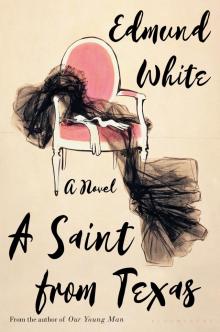 A Saint from Texas
A Saint from Texas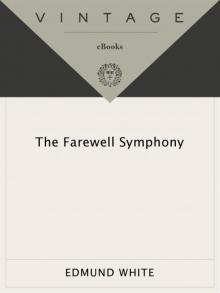 The Farewell Symphony
The Farewell Symphony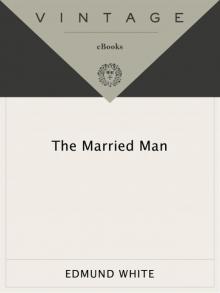 The Married Man
The Married Man A Boy's Own Story
A Boy's Own Story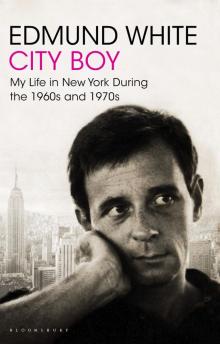 City Boy
City Boy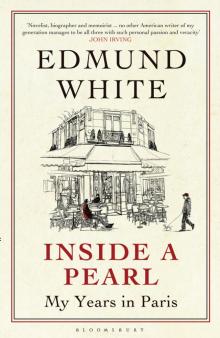 Inside a Pearl
Inside a Pearl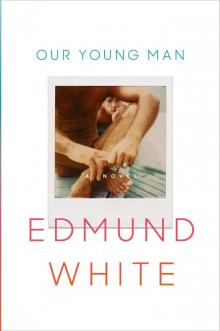 Our Young Man
Our Young Man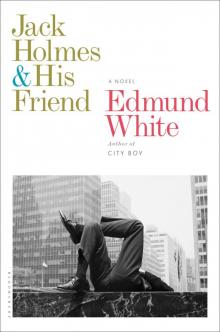 Jack Holmes and His Friend
Jack Holmes and His Friend